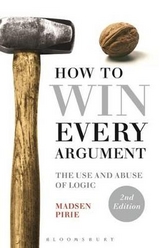How to Win Every Argument
Bloomsbury Academic (Verlag)
978-1-4725-2912-1 (ISBN)
He identifies with devastating examples all the most common fallacies popularly used in argument. We all like to think of ourselves as clear-headed and logical - but all readers will find in this book fallacies of which they themselves are guilty. The author shows you how to simultaneously strengthen your own thinking and identify the weaknesses in other people arguments. And, more mischievously, Pirie also shows how to be deliberately illogical - and get away with it. This book will make you maddeningly smart: your family, friends and opponents will all wish that you had never read it.
Publisher's warning: In the wrong hands this book is dangerous. We recommend that you arm yourself with it whilst keeping out of the hands of others. Only buy this book as a gift if you are sure that you can trust the recipient.
Madsen Pirie is President of the Adam Smith Institute, UK and author of numerous books including Boost Your IQ and The Sherlock Holmes IQ Book. He was formerly Distinguished Visiting Professor of Philosophy and Logic at Hillsdale College, Michigan, USA. He appears regularly as an expert on CNN and BBC television.
Introduction
1. What is an Argument
2. What does a Successful Argument Look Like?
3. What counts as Evidence?
4. Oral Arguments
a) arguing with a friend
b) arguing in a group
c) arguing in a formal debate
d) Presenting your case in a meeting
5. Written Arguments
a) arguing in a letter, article of newspaper
b) arguing on the internet
c) how to argue on facebook
d) winning an argument in 140 characters (arguing on twitter)
79 A-Z entries, including:
Abusive analogy
Blinding with science
The complex question
Damning the alternatives
Exclusive premises
The gambler's fallacy
Hedging Irrelevent humour
Loaded words
The red herring
Shifting ground Trivial objections
Wishful thinking
| Erscheint lt. Verlag | 12.3.2015 |
|---|---|
| Verlagsort | London |
| Sprache | englisch |
| Maße | 129 x 198 mm |
| Gewicht | 272 g |
| Themenwelt | Geisteswissenschaften ► Philosophie ► Logik |
| ISBN-10 | 1-4725-2912-X / 147252912X |
| ISBN-13 | 978-1-4725-2912-1 / 9781472529121 |
| Zustand | Neuware |
| Haben Sie eine Frage zum Produkt? |
aus dem Bereich




